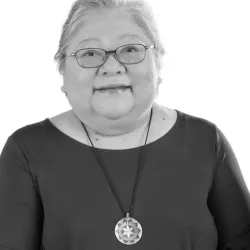Nkwelutenlhkalha - Our Talk. Indigenous Languages and the UN Decade of Indigenous Languages 2022 – 2032
In April Canada launched their involvement in the UN Decade of Indigenous Languages, the celebration was convened by Perry Belgarde, President of the Canadian Geographic Society and the Governor General Mary Simon honoured the launch by giving an opening address in three languages – Inuktitut, English and French. Another highlight were the performances by Indigenous artists, singing and speaking in their own languages. Shifting between their Indigenous languages and either English or French with such ease. A speaker was Chief Willie LittleChild who was one of the leaders who also initiated the Year of Indigenous Languages of 2019 along with strong leadership from BC through the work of Edward John.
The 2019 Year of Indigenous Languages showed us how such a proclamation can have an impact on the work of Indigenous Languages here in Canada and how connecting with Indigenous peoples around the world can form strong partnerships and collaborations. It also helps leaders and society to have a better understanding of the importance of the original languages of all the lands. In 2019 Canada passed its Indigenous Languages Act, an opportunity to putting into place recognition of all its First Languages and establishing processes to supporting those languages for reclamation, revitalization and maintenance and to finally appreciate that languages existed on these lands before colonial settlement. An Indigenous Languages Commissioner is in place to actualize this new ‘Act’.
One of the activities in 2019 was the cohosting of a world wide conference on Indigenous Languages, HELISET TŦE SKÁL 'Let the Languages Live', co-facilitated by First Peoples Culture Council and First Peoples Cultural Foundation in Victoria BC. Alongside this conference was a conference by UNESCO, who held meetings on Indigenous Languages, while attending the Heliset conference in between meetings. This experience informed their vision for establishing the Decade of Indigenous Languages. First Peoples Cultural Council and Foundation also was invited present Keynote addresses at the UNESCO conference on Indigenous Languages and technology in Paris 2019 to close the Year of Indigenous Languages.
What do we hope to achieve for Indigenous Languages in the next 10 years? We have work to address the needs of reclaiming, revitalizing and maintaining all Indigenous Languages by working alongside Indigenous people who take a leadership role in directing the work. This is critical because when Indigenous take a leadership role it is more possible that the efforts are long term and follow an Indigenous way of carrying out the work. Countries need to work with indigenous Peoples to change and shift the structures of the institutions created to serve society. For example in Education, which has evolved to carry out the value system and knowledge systems of the Eurowestern world, changes will need to be made to identify Indigenous informed structures, values and knowledge. It means learning to listen to one another, to build new structures together respecting and honouring all the complexities and beauty of different ways of being in the world.
Recently UNESCO hosted a World Conference on Higher Education. There was one session on Indigenous knowledge where presenters highlighted the need for changes to respectfully create spaces in academia for Indigenous knowledge and languages. At this time in Canada there is no place for Indigenous Languages to be learned and to prepare teachers and study of languages from an Indigenous perspective. As young people are learning again in their languages, learning on their lands, and in their traditions we need to support them by having the appropriate educators, Indigenous informed research, understanding and countering colonial habits in learning and expectations. This conversation is a beginning and we have 10 years to work together to come up with creative and respectful innovations.






